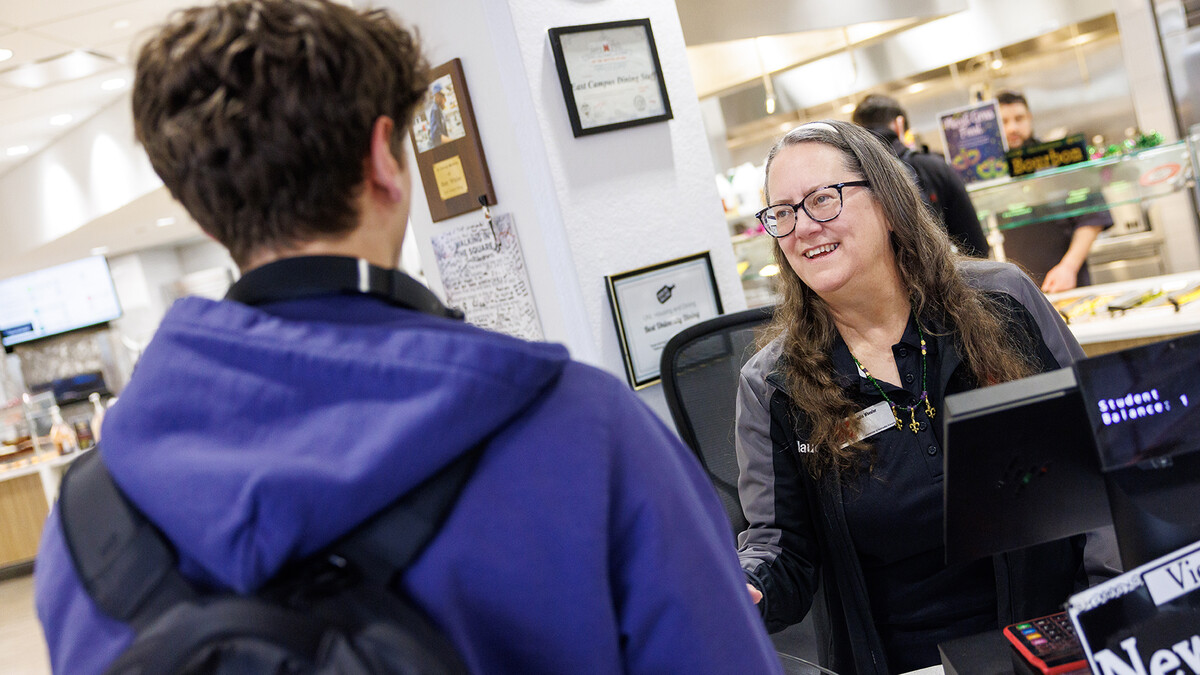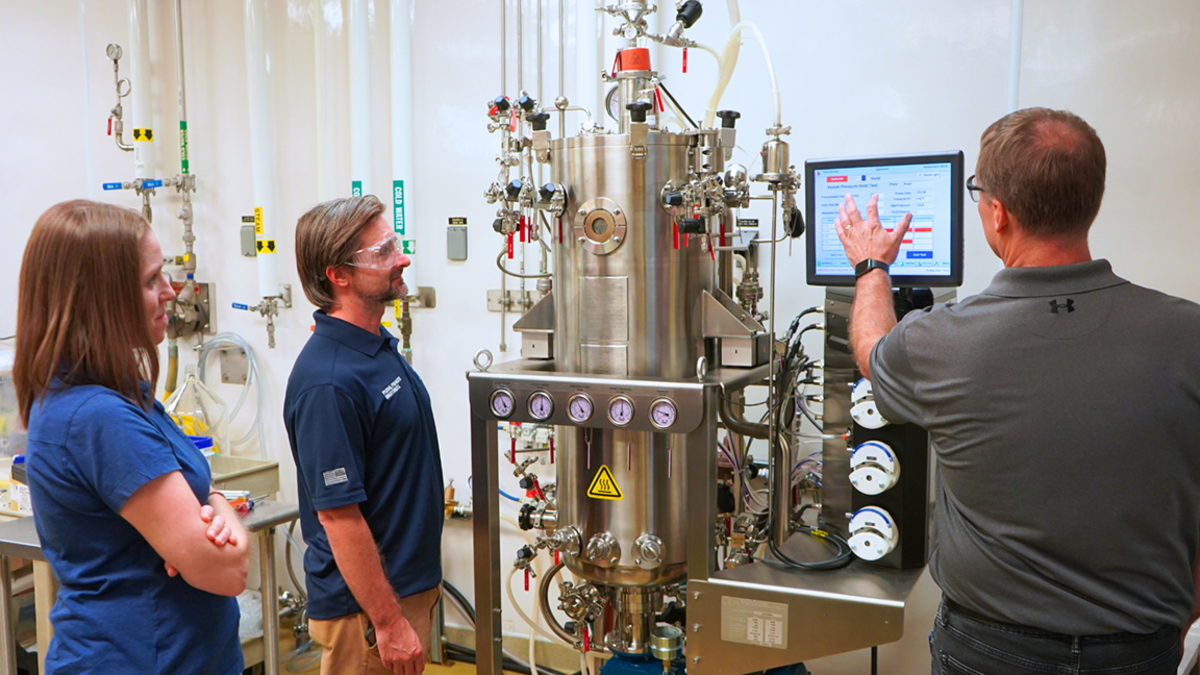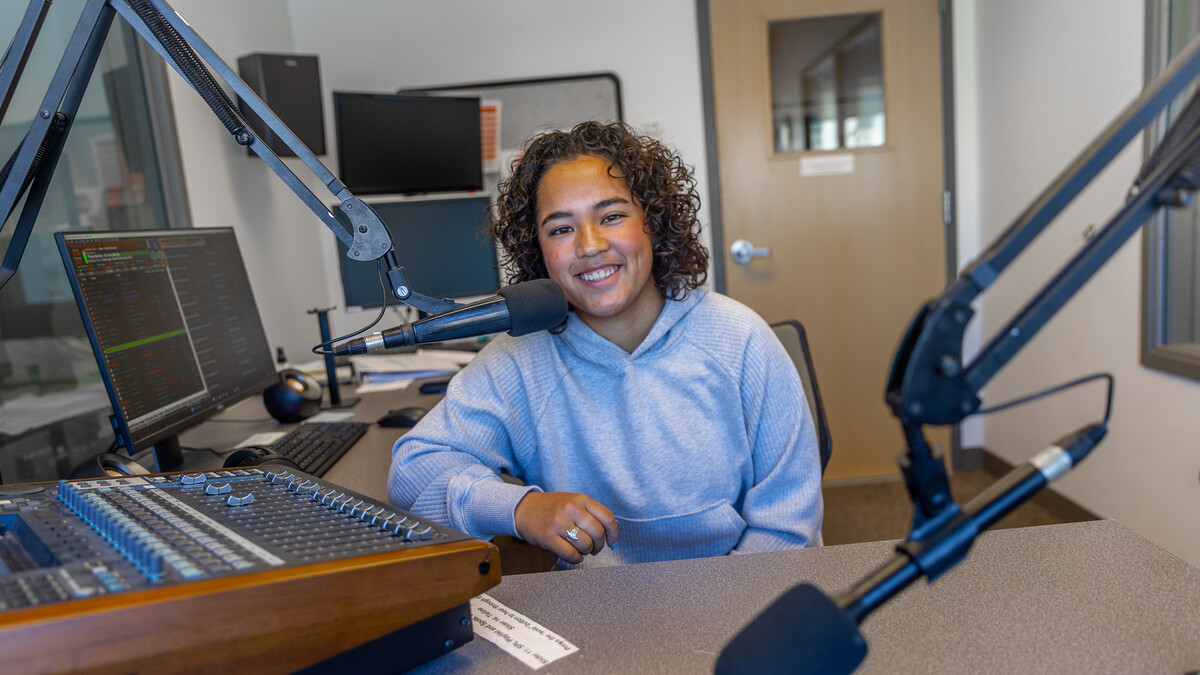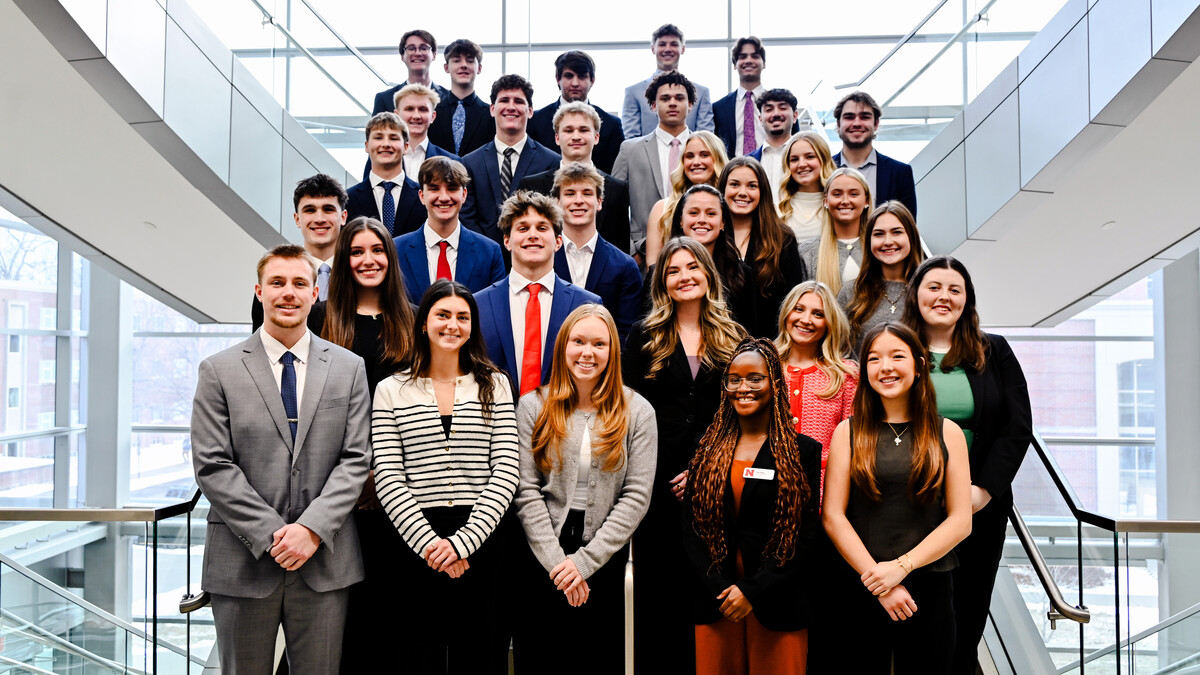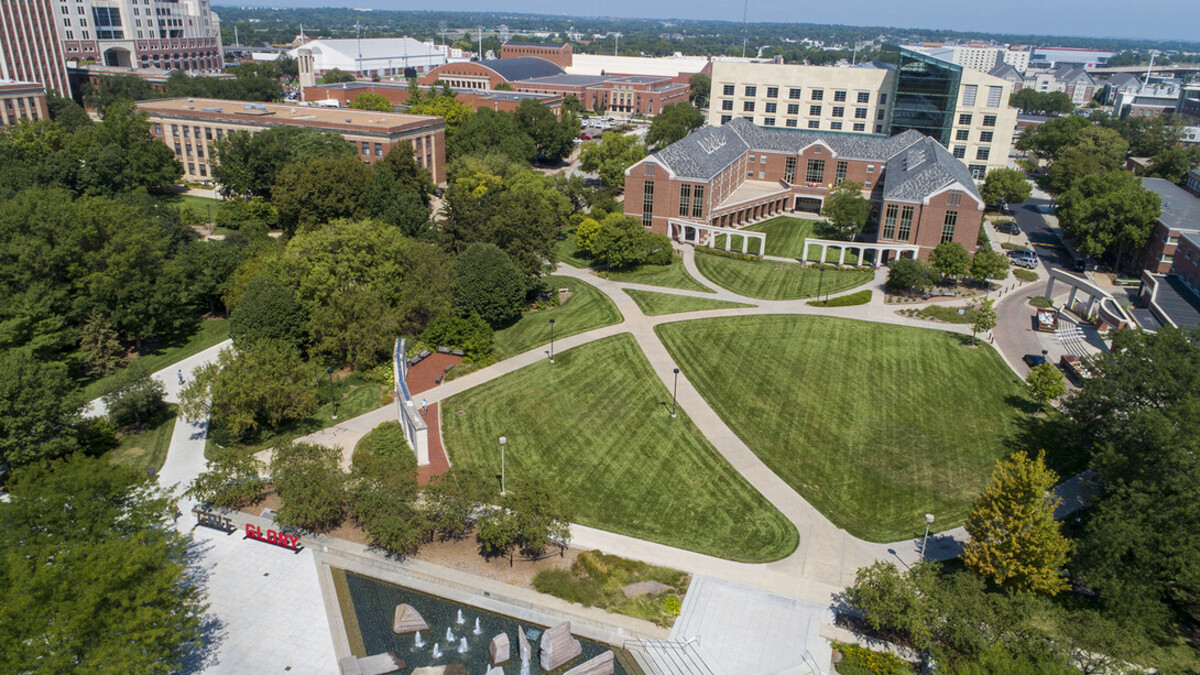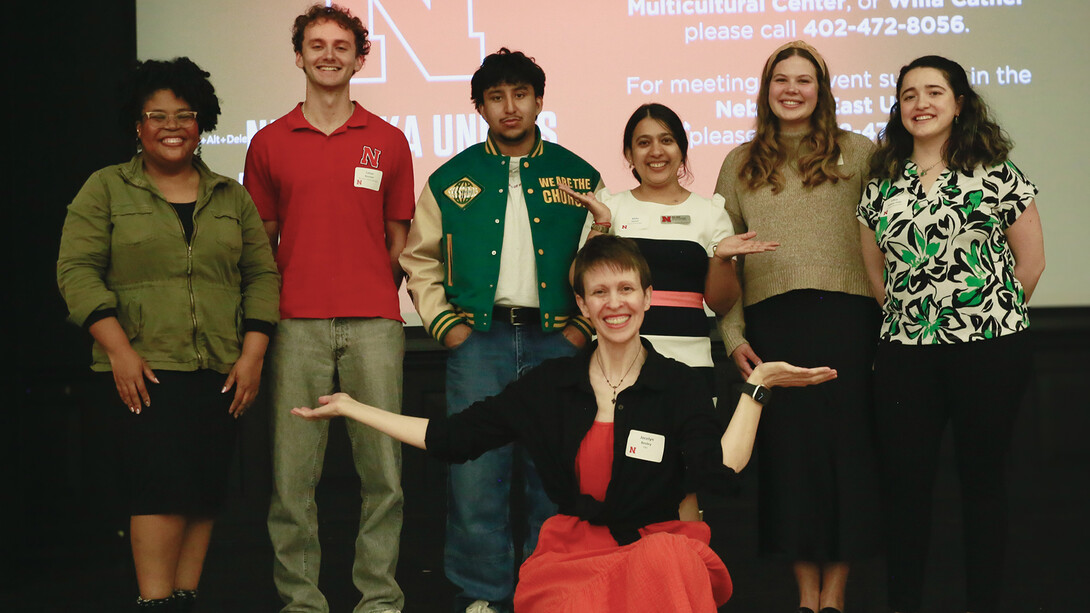
A first in University of Nebraska–Lincoln's Student Research Days Slam history a tie vote — as student presenters hopped into a time machine to take the stories of their research into the future or past to connect their experiences with those who came before them or those who will come after.
Jocelyn Bullock, a graduate student in agricultural leadership, education and communications, and Emma Conradi, graduate student in speech-language pathology, were co-winners of the audience-judged competition Aug. 17, conducted with the question prompt: “If you could travel into the past or the future to tell people about your research or creative endeavor, where would you go, who would you talk with and what would you tell them?”
Jocelyn Bosley, research impact coordinator, said this year’s student slam came at a particularly fraught time, as universities’ research mission faces new federal funding challenges.
It’s more important than ever, Bosley said, for the research community, including students, to effectively communicate the importance of their work.
This year’s six student slammers were more than up to the challenge.
Bullock traveled back to her ancestors to ask, “Where’d all the Black brewers go?” As it happens, she discovered, there were distillers and winemakers on both sides of her family, including, on her mother’s side, her grandmother’s grandmother who plied the trade during Prohibition and, on her dad’s side, a forebear who made moonshine during the slavery era.
Other Black brewers in history included Peter Hemings, Sally Heming’s brother, who was a classically trained French chef and head brewer at Thomas Jefferson’s Monticello; and Piety Young, an enslaved woman listed as a seamstress, cake decorator and brewer.
Today, fewer than 1% of the breweries in the United States are owned by Black people.
The brewing gene lives on in Bullock, who took a course in how to make beer and who is in talks with a local brewery that wants to feature her concoction, Eliza’s Brew, on its fall menu.
“So now when people ask where all the black brewers are, I can proudly say, ‘I'm right here!’” Bullock said.
Conradi would love to tell those who came before her — researchers, teachers, parents and, most of all, individuals with disabilities — that today, people with Down syndrome and other disabilities, “are capable of so much more than the world ever gave them credit for.”
“Children, regardless of their diagnosis, can go to school, build a career and chase their dreams. But then I stopped and asked myself … how much has really changed,” Conradi said. “Don’t get me wrong — there have been some incredible strides, especially through legislation and advocacy. But the truth is, many individuals with disabilities still can’t access the jobs they dreamed of as kids. Parents are still out there, fighting tirelessly for the basic supports their children need just to thrive in school. And across the field of special education and communication disorders, there’s still a huge research gap — and even less funding to help close it.”
For her master’s thesis, Conradi is studying individuals with mosaic Down syndrome, a rare and often overlooked karyotype of Down syndrome in which only a percentage of a person’s cells carry the extra 21st chromosome. Recent research suggests that this population is frequently misdiagnosed — and that some individuals believed to have full trisomy 21 may have mosaic Down syndrome instead.
So, Conradi said, she’d like to go into the future, too, “to a world where everyone has the equal opportunity to succeed,” and talk about her research that helped break down barriers.
Other competitors in the event included:
Libia Gomez-Trejo, a graduate student in complex biosystems, who would go back to her Mexican ancestors to talk about maize, considered a sacred grain “that is not just something we eat; it is a part of who we are, because the story of Mexico cannot be told without maize.”
“I would tell them, ‘Look at what you did! Your treasure, your precious maize, now grows places very far away from your land. It feeds people from all over the world, from many different places and with many different traditions that speak different languages.”
But Gomez-Trejo also would tell them that maize is under threat today. Diseases endanger it, and her job, studying the peril of fungi, aims to protect the crop for future generations.
“I would look at them and say, ‘You gave us maize. And now, I am working to protect it. I want to thank you for this gift and tell you that me and so many other people are working hard to preserve this magic gift.’ … I can do amazing, practical and applicable science and at the same time I can proudly honor my legacy as a ‘child of corn.’”
Kenny Morales and Lance Buscher, juniors majoring in, respectively, software engineering and business administration, discussed LifeLinks, an app they’ve created to encourage connections among people in senior living facilities.
They said they created the app out of concern that human connections are fading, that seniors, in particular, can feel lonely and unable to reach out.
The app grew out of conversations with residents. “From these people, we learned a key insight on how to get people to engage in real connection – storytelling,” Buscher said.
Their storytelling app encourages face-to-face interaction.
Shilu Dahal, a graduate student in plant pathology, remembers her farmer grandfather who suffered health problems from the synthetic pesticides that treated his fields. She shared a brief history of the development of pesticides and the dawning realization of their health dangers.
She would love to go back in history to tell skeptical farmers and the powerful chemical industry about the threat – and to tell them about how crop security and environmentalism can exist side by side, thanks to beneficial microbes that fight disease, promote plant health and offer sustainable protection without chemicals.
“That’s what my research is about, and that’s what I can offer to the past,” Dahal said.
“We no longer have to choose between protecting our crops and protecting our planet. My work is a call to reimagine agriculture. Not as a battle against nature but as a partnership with the friendly organisms that have been here long before us.”
The Slam, part of the annual Student Research Days, was co-sponsored by the Office of Graduate Studies and the Office of Undergraduate Research and Fellowships.
